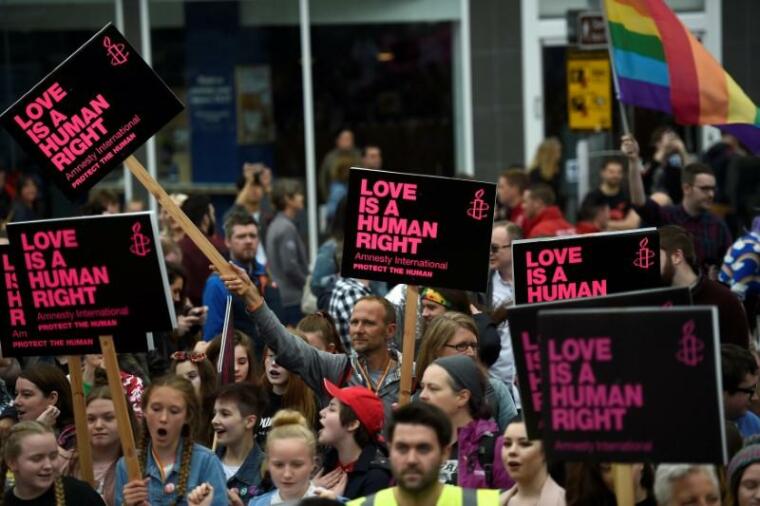Irish court upholds ban on same-sex marriage

The High Court in Northern Ireland has dismissed two cases challenging a law banning same-sex marriage in the region.
The court ruled on Thursday that Northern Ireland's law banning gay marriage does not violate the rights of same-sex couples. The region is the only jurisdiction in the U.K. that still upholds its ban on same-sex marriage, even though it was the first part of the country to pass a law legalizing civil partnerships in 2004.
The first case challenging the ban was filed by two men who married in London in 2014 and were attempting to have their union recognized in Northern Ireland. According to The Guardian, their marriage was changed to a civil partnership in law after they moved to the region.
In the second case, two couples in civil partnerships — Grainne Close and Shannon Sickles, and Chris and Henry Flanagan-Kane — argued that the law violated their human rights.
Justice O'Hara, who heard the cases together due to the similarities of the legal arguments, dismissed both lawsuits on Thursday, arguing that the ban does not contravene human rights "because that right does not exist."
"It is not difficult to understand how gay men and lesbians, who have suffered discrimination, rejection and exclusion, feel so strongly about the maintenance in Northern Ireland of the barrier to same-sex marriage," the judge stated. "However, the judgment which I have to reach is not based on social policy but on law," he continued.
The lawyers in the case argued that the ban violated Article Eight of the European on Human Rights, by denying respect for the plaintiffs' private and family lives. However, O'Hara maintained that the right to same-sex marriage has never been recognized by the European Court of Human Rights.
The judge further stated that it was up to the Stormont assembly to decide social policy in Northern Ireland.
"It's not the role of a judge to decide social policy, that is for the Executive and the Assembly under our constitution," he said referring to Northern Ireland's government structures.
Traditionally Catholic parties like the Sinn Fein, and the moderate SDLP, support ending the ban on same-sex marriage. However, two parties representing the Protestant majority, the Democratic Unionist Party (DUP) and Ulster Unionist Party (UUP), have both supported the traditional definition of marriage as exclusively between one man and one woman.
In Europe, same-sex marriage has already been legalized in Belgium, Denmark, Finland, France, Germany, Iceland, Ireland, Luxembourg, Malta, Netherlands, Norway, Portugal, Spain, Sweden and the United Kingdom, with the exception of Northern Ireland.
 Christians don't have to affirm transgenderism, but they can’t express that view at work: tribunal
Christians don't have to affirm transgenderism, but they can’t express that view at work: tribunal Archaeology discovery: Medieval Christian prayer beads found on Holy Island
Archaeology discovery: Medieval Christian prayer beads found on Holy Island Presbyterian Church in America votes to leave National Association of Evangelicals
Presbyterian Church in America votes to leave National Association of Evangelicals Over 50 killed in 'vile and satanic' attack at Nigerian church on Pentecost Sunday
Over 50 killed in 'vile and satanic' attack at Nigerian church on Pentecost Sunday Ukrainian Orthodox Church severs ties with Moscow over Patriarch Kirill's support for Putin's war
Ukrainian Orthodox Church severs ties with Moscow over Patriarch Kirill's support for Putin's war Islamic State kills 20 Nigerian Christians as revenge for US airstrike
Islamic State kills 20 Nigerian Christians as revenge for US airstrike Man who served 33 years in prison for murder leads inmates to Christ
Man who served 33 years in prison for murder leads inmates to Christ


 Nigerian student beaten to death, body burned over ‘blasphemous’ WhatsApp message
Nigerian student beaten to death, body burned over ‘blasphemous’ WhatsApp message 'A new low': World reacts after Hong Kong arrests 90-year-old Cardinal Joseph Zen
'A new low': World reacts after Hong Kong arrests 90-year-old Cardinal Joseph Zen Iran sentences Christian man to 10 years in prison for hosting house church worship gathering
Iran sentences Christian man to 10 years in prison for hosting house church worship gathering French Guyana: Pastor shot dead, church set on fire after meeting delegation of Evangelicals
French Guyana: Pastor shot dead, church set on fire after meeting delegation of Evangelicals ‘Talking Jesus’ report finds only 6% of UK adults identify as practicing Christians
‘Talking Jesus’ report finds only 6% of UK adults identify as practicing Christians Mission Eurasia ministry center blown up in Ukraine, hundreds of Bibles destroyed: 'God will provide'
Mission Eurasia ministry center blown up in Ukraine, hundreds of Bibles destroyed: 'God will provide' Church holds service for first time after ISIS desecrated it 8 years ago
Church holds service for first time after ISIS desecrated it 8 years ago Burger King apologizes for 'offensive campaign' using Jesus' words at the Last Supper
Burger King apologizes for 'offensive campaign' using Jesus' words at the Last Supper Uganda: Muslims abduct teacher, burn him inside mosque for praying in Christ’s name
Uganda: Muslims abduct teacher, burn him inside mosque for praying in Christ’s name